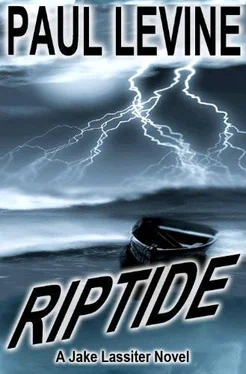Paul Levine - Riptide
Здесь есть возможность читать онлайн «Paul Levine - Riptide» весь текст электронной книги совершенно бесплатно (целиком полную версию без сокращений). В некоторых случаях можно слушать аудио, скачать через торрент в формате fb2 и присутствует краткое содержание. Жанр: Криминальный детектив, на английском языке. Описание произведения, (предисловие) а так же отзывы посетителей доступны на портале библиотеки ЛибКат.
- Название:Riptide
- Автор:
- Жанр:
- Год:неизвестен
- ISBN:нет данных
- Рейтинг книги:3 / 5. Голосов: 1
-
Избранное:Добавить в избранное
- Отзывы:
-
Ваша оценка:
- 60
- 1
- 2
- 3
- 4
- 5
Riptide: краткое содержание, описание и аннотация
Предлагаем к чтению аннотацию, описание, краткое содержание или предисловие (зависит от того, что написал сам автор книги «Riptide»). Если вы не нашли необходимую информацию о книге — напишите в комментариях, мы постараемся отыскать её.
Riptide — читать онлайн бесплатно полную книгу (весь текст) целиком
Ниже представлен текст книги, разбитый по страницам. Система сохранения места последней прочитанной страницы, позволяет с удобством читать онлайн бесплатно книгу «Riptide», без необходимости каждый раз заново искать на чём Вы остановились. Поставьте закладку, и сможете в любой момент перейти на страницу, на которой закончили чтение.
Интервал:
Закладка:
The wind let up at sundown, just a puff by Maui standards, twelve to fifteen knots from the northeast. He could sail on a starboard tack all the way across the Pailolo Channel. From the beach at Honokahua he could see Molokai, silhouetted in the darkness, rising like a black monolith, its southern coastline a jungle devoid of lights. The night was clear and a three-quarter moon cast a milky glow on the peaking waves. Lassiter fell once getting beyond the surf line, but once was enough. Freezing now, a shivering, bone-deep cold.
The water was choppy and the board pitched beneath him, but in a few minutes his legs were making the adjustments, knees bending, weight shifting without any message from his brain, just doing it on autopilot. At the same time, his arms were letting out the sail and raking it in, allowing the rhythms of the wind and water dictate the movements. It was peaceful here on the black sea and he wanted to enjoy it before the quiet was shattered on a desolate island.
The dark monolith grew larger and Lassiter was aware of how small he was, bucking the waves on a fiberglass board, an infinitesimal speck on a vast sea. It made him think of the insignificance of what he would do, at least in the universal scheme of things. If Keaka would die, or if he would die, the moon would still pass through its phases, and the tide would still rise and fall. We are born, puny and weak, and set afloat on the waters of a small planet in a runty solar system, and if we capsize, as we surely will, there will be others, just as puny, to take our place. Everything we have created, good and bad, will fade and crumple and be lost to the winds of time. Those who mourn our departure will pass, too, so that all memories of us will die in the flicker of a cosmic eyelash. Rather than depress him, these thoughts calmed Lassiter with the knowledge that life was so fleeting, it was useless to waste precious moments in a state of fear.
He was thinking these thoughts, wondering if he would be alive to share them with Doc Riggs, when he felt something. Felt it before he heard it.
The water beneath him moving.
Suddenly, an explosion.
A deafening concussion and a wall of water that engulfed him.
The sea rose from beneath Lassiter and hurled him into the blackness. He belly-flopped into the channel, graceful as a rhinoceros. He kicked twice and surfaced, eyes stinging, a gash on the forehead where the boom had sideswiped him. His first thought was that his board had hit some unexploded Japanese mine from World War II. But treading water, Jake Lassiter saw it, or at least part of it: the mammoth tail of a humpback whale visible forty feet above the water, the rest of the animal hidden below. Then a prehistoric shove, the tail whipped once, and the beast slipped under the sea. Another wave swamped Lassiter, and he tasted salt water, raw in his throat.
Save the whales! My ass.
It was the migrating season for humpback whales, and one had breached alongside of him. Lassiter was still treading water when he realized that his board wasn’t next to him. He had lost precious seconds watching the whale, and the board had drifted away. If Lassiter were ten feet above the water, he could have seen the moon glowing off the fiberglass or illuminating the sail. But he was mostly under the water, kicking his legs to keep his nose high enough to breathe. Lila’s harness was too small for his chest and pressed hard against his rib cage. It had no flotation material and the weight of the metal simply made him heavier. He was growing tired. He could swim in the direction he thought the board had drifted, but make a mistake, chase the wrong receiver, the coach would scream, and the board would be halfway to Tahiti.
He looked through the darkness toward Molokai. He looked back toward Maui, getting his bearings, then swam twenty yards downwind and there it was, the boom lying across the stern of the board, waiting for him to pick it up. The wind was barely strong enough to water-start, but he got it going, then checked his gear. The Colt Python was still snug in the harness pouch, but the three pounds of stainless steel now bashed his shoulder blade with every wave. He carried something else, too: a ton of fatigue. His arms were dead, and his legs no longer responded to the sea, the adrenaline having been sapped. He thought of a November homecoming game played in a sleet storm in old Beaver Stadium, his uniform and pads weighted down by icy water, black high-tops caked with frozen mud.
Wasted. Out of shape. Winded, breathing through the mouth now. His mind wandered. Too much happening too fast, he thought. You don’t run into many whales if you spend your days trying lawsuits in an old courthouse on Flagler Street.
He could hear the water breaking now over shallow reefs. In the distance he saw the tiny lights from the town of Kaluaaha where the road ended on Molokai and the jungle swallowed the night.. He looked for the lighted weather buoy and it was there, just as Lila said it would be, and he had a clear passage through the rocks to the shore.
Then there was a sound. At first Jake Lassiter thought it must have been a phenomenon of the wind whistling through the rocks. It was a voice without direction. It came from nowhere and everywhere.
“Aloha, haole.”
Lassiter heard it again, closer this time. “ Aloha, haole. Are you looking for me?”
Beside him now, emerging from the darkness, riding easily over the small waves, was Keaka Kealia. He was sailing ten yards away, hands lightly grasping his boom, wearing a loincloth made of animal skin. The Hawaiian out for a nighttime joyride, Lassiter thought, crazily, the danger not yet sinking in. Then he saw it dangling from Keaka’s shoulder — an Uzi, the Israeli submachine gun. The water was growing more shallow, but the waves were increasing as they passed over the reef and Lassiter was unsteady. Keaka sailed slightly behind him and Lassiter kept shooting glances over his left shoulder.
“I’m still here, haole. I want to see what you do when you get to shore, if you get to shore.” Then Keaka raked in the boom, pulling the sail over the board, leaned back, and shot by Lassiter, cutting inches in front of him, heading toward the beach, the Uzi swinging ominously from his shoulder.
There were not many choices, Jake Lassiter thought. He could head for shore, ditch the rig in the surf and swim in, hiding in the massive boulders along the rocky beach. Or he could try to reach the gun in his pack, and then…
A flash of light interrupted him, the moon reflecting off the bottom of Keaka’s board. The Hawaiian must have jibed, for now he was headed straight at Lassiter, jumping over the lips of the breaking waves while Lassiter surfed down their front heading in. Another wave, another jump, and Keaka was bearing down on him. They were on a collision course, drawing closer with each second.
Keaka hit a wave, timed it just right, and lifted off. Then with his ankles, he pulled the board onto its side, perpendicular to the water, a mule-kick. The board’s sharp fin whizzed by Lassiter’s ear and slashed a three-foot-long tear in his sail.
Lassiter toppled off the board, his harness still hooked into the boom lines, the torn sail wrapped around him, his head under water, his lungs out of breath. Keaka Kealia brought his board out of the jump and landed gracefully as a cat, never losing his balance. He jibed and swung back around to find his prey floundering under the sail, trying to kick himself free.
Keaka shouted at him,” Aloha, haole! Hello and good-bye.”
Struggling under the water, Lassiter never heard the Hawaiian.
Keaka held the boom with one hand and sailed by slowly, luffing the sail. He aimed the Uzi at the back of Lassiter’s harness, still wrapped in the sail, and squeezed off a quick burst of nine-millimeter shells. Then Keaka raised the gun above his head and sailed to shore singing ancient war songs in the language of his ancestors.
Читать дальшеИнтервал:
Закладка:
Похожие книги на «Riptide»
Представляем Вашему вниманию похожие книги на «Riptide» списком для выбора. Мы отобрали схожую по названию и смыслу литературу в надежде предоставить читателям больше вариантов отыскать новые, интересные, ещё непрочитанные произведения.
Обсуждение, отзывы о книге «Riptide» и просто собственные мнения читателей. Оставьте ваши комментарии, напишите, что Вы думаете о произведении, его смысле или главных героях. Укажите что конкретно понравилось, а что нет, и почему Вы так считаете.












